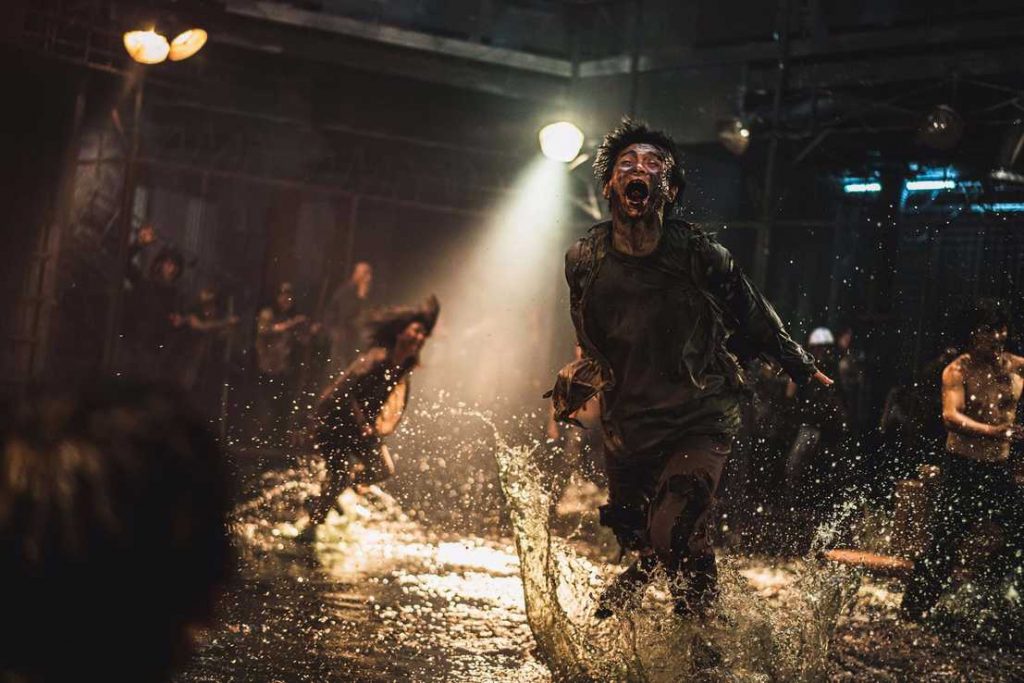
Refugee Chul-min (Kim Do-yoon) first fled South Korea during the initial zombie outbreak four years ago. He returns to the abandoned city of South Korea, now known as “the peninsula”, to retrieve lost cash for a Hong Kong mob – only to be welcomed by a horde of the undead upon accidentally triggering a car horn. The dark and devastated streets begin to fill with a surge of zombies as a terrified Chul-min shuts himself in the back of a van and tries to be as quiet as possible. Just when the sounds die down and he thinks the worst is over, the doors are thrown open. However, instead of the snarls of the zombies, he is greeted by the maniacal laughter of a gang of grimy, barbaric men in tactical uniforms. “Put him in the arena,” commands one of the men, and the rest roar and cheer, mocking him as they haul him out of the van and into a military compound.
Chul-min is dragged into the building and thrown into a massive metal cage. Spotlights blind him and the roars of hundreds rattle his eardrums. Taking in the scene around him amidst his shock, Chul-min sees corpses hanging from the ceiling high above and crowds surrounding him, joking around and placing bets behind the metal bars. He pleads desperately for help but they simply laugh at him.
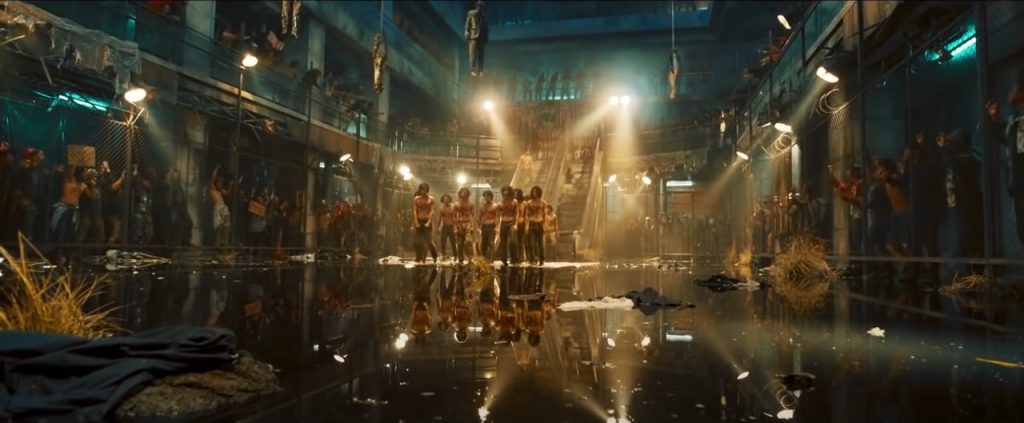
Minutes later, stripped of his clothing and spray-painted with the number #61, he stands among similarly fearful men in a sickening display of what seems to be a gladiatorial arena. A buzzer sounds off and a giant clock begins to count down from two minutes. Just as a pair of doors swing open to reveal a heaping mass of hungry, snarling zombies, it becomes clear that what’s scary isn’t the undead ready to devour him, it’s the people that put him in there.
The Mob Mentality
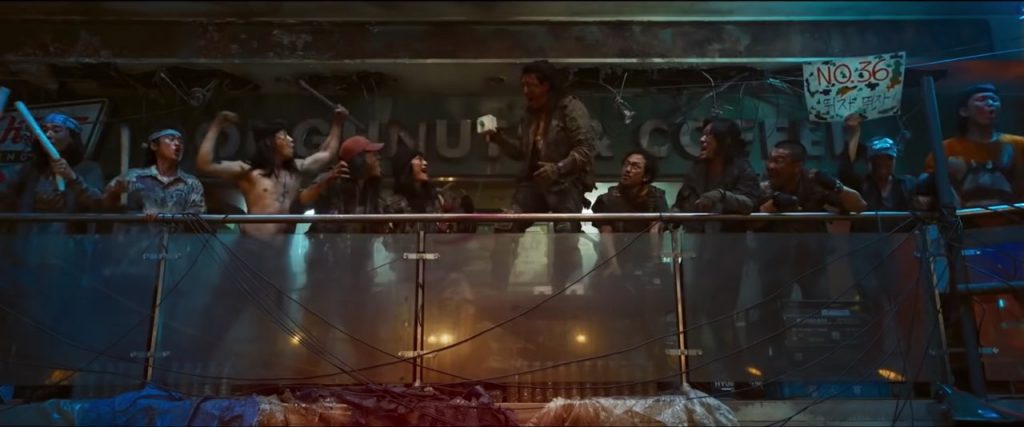
The people who threw him into the arena are a military group called Unit 631. Peninsula’s portrayal of the mob mentality (or herd mentality) reflects how society would function as a mob without the systems we live under. Unlike most zombie flicks such as Dawn of the Dead and Zombieland, the main villain in Peninsula isn’t the zombies themselves, but a group of humans – Unit 631.
The group has no clear rules and is led by military leaders (and villains) Sergeant Kwang (Kim Min-Jae) and Captain Seo (Koo Gyo-Hwan). The group acts on impulse, reacting and behaving like animals within the military compound. “The game” was created for their entertainment, where survivors like Chul-min (referred to as “prey”) are thrown into the gladiatorial arena and forced to try and survive a zombie onslaught for a limited time; the same survivors they were sent here to protect.
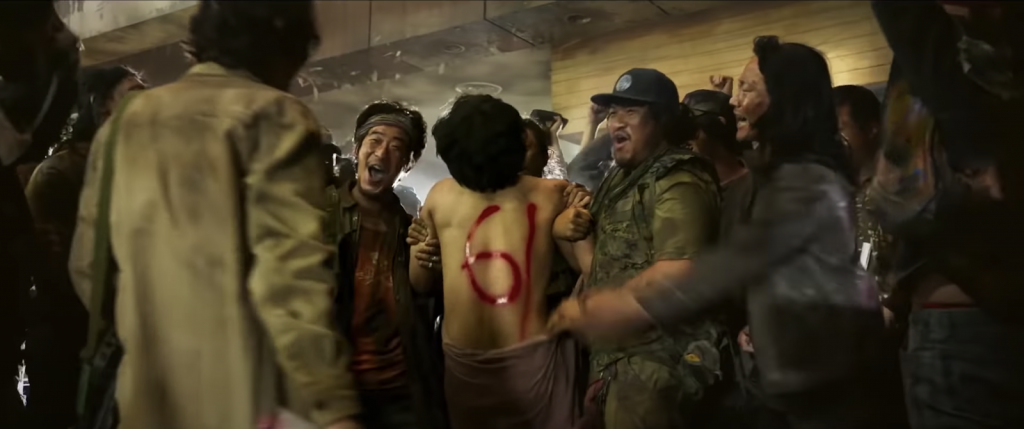
Unit 631 is portrayed as a mob under the Crowd Frenzy, where crowds easily turn “uncontrolled, wild and frenzied”, resulting in unreasonable and emotionally charged behaviour among the members. Sergeant Kwang’s antics, such as killing a survivor or announcing the start of a game, often results in cheering and energising the crowd, whereas it would normally be considered abnormal and wrong. We often see this in our society, where when a group of people come together, they think of themselves as one united group and no longer make decisions they usually would as individuals.
A recent example of this would be the Mondragone riots last month, where a cluster of Covid-19 cases among foreign farm workers led to a clash between locals and foreigners. The workers wanted to return to work for food, but locals blamed them for spreading the virus and began to act irrationally, hurling stones and destroying cars near the estate the workers stayed in, despite relying on them to maintain their farms. It’s interesting and relevant that returning director Yeon Sang-ho decided to portray the mob mentality in Peninsula, particularly in the current climate of the pandemic and social revolution in today’s world.
Xenophobia In The World
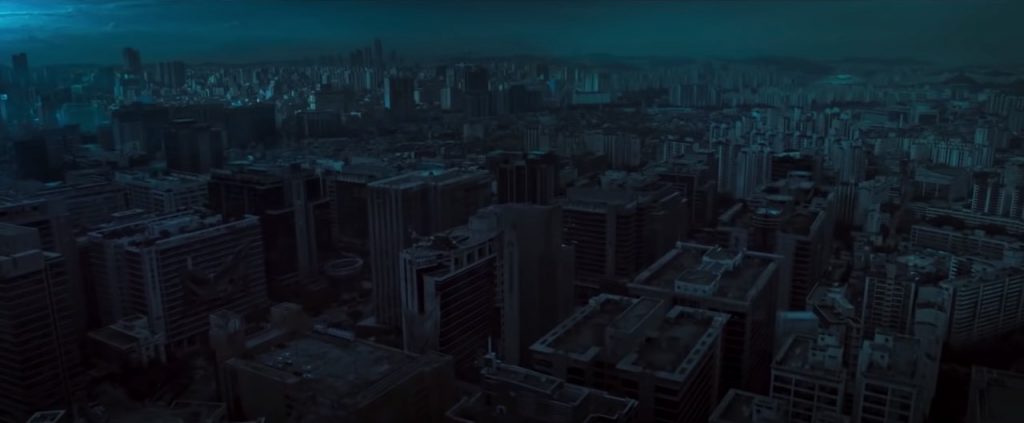
Through the portrayal of society towards refugees in Peninsula, a clear commentary is made on the issue of xenophobia, the fear or hatred of foreigners. Four years after the events of Train To Busan, the world has cut off the initial zombie outbreak by evacuating and isolating South Korea, leaving it abandoned and overrun by zombies. The isolation of “the peninsula” lays the foundation for the xenophobia faced by the refugees in the movie.
The xenophobia most prominently takes form in a scene where two South Korean refugees are having a drink at a store in Hong Kong when suddenly, a few locals call them out for being possibly infected refugees from “the peninsula”. The refugees try to pay for the drinks and leave, but the store owner refuses to accept their payment. This is scarily similar to how, in the wake of the Covid-19 pandemic, racism and physical attacks on Asians and people of Asian descent have increased, with many suspecting or blaming them for allegedly starting or carrying the virus simply because the virus was believed to have started in China. It echoes the instance of a Singaporean student being beaten up in a racially-aggravated assault in London, where assailants accused him of “spreading the Coronavirus in their country”. Though no particular action is taken towards solving this issue in the movie (it’s a zombie flick, after all), the portrayal of the South Korean refugees clearly highlights the issue of how refugees are treated in society.
Familial Bonds

A fact soon to become the signature of Director Yeon’s films in the Train To Busan universe is that nothing is more important than the society of family, and this is definitely highlighted in Peninsula.
Protagonist Jung-seok (Gang Dong-won) is first introduced to a family of survivors in the peninsula when Joon (Lee Re) and Yu-jin (Lee Ye-Won) come to his rescue while he is being overwhelmed by zombies. Jung-seok then meets their mother, Min-jung (Lee Jung-hyun) and an elderly former commander of Unit 631 known as Elder Kim (Kwon Hae-hyo), though the girls refer to him as “grandpa”. Though he lost his own sister four years ago to a zombie attack while he was fleeing South Korea and has since been living alone, Jung-seok quickly realises as he fights to escape the peninsula with the family that he has become emotionally attached to them.

Jung-seok finds that he wants to protect the family at his own risk, despite his cold and practical character. Through their relationships, we realise that family means more than the difference between life and death; it can even give someone a reason to live or die.
“I wanted to show that (survival is not about) where you are at but whom you are with,” said Director Yeon at a press conference for the movie in Seoul.
Summary
All in all, Peninsula has made its mark as an independent film in the same universe as Train To Busan, rather than being labelled as a generic sequel. The cast is smartly picked, though Gang Dong-won’s stylish action scenes fail to make up for his lackluster emotional range. Lee Jung-hyun shines as the female lead, and young hearts Lee Re and Lee Ye-Won both deliver a convincing performance. The soundtrack effectively builds tension throughout the movie, though it offers little range in quiet and emotional moments. The computer-generated imagery is inconsistent in some places, particularly with car collisions looking rather unrealistic. However, Director Yeon’s camerawork shines through, with gorgeous wide shots to capture the abandoned peninsula and smooth one-take shots to track the action scenes.
While zombie movie fans who thought Train To Busan was fantastic will definitely love Peninsula, Train To Busan fans who cried over the emotional beats that the movie drummed and want more may be disappointed. Peninsula has a completely different cast, tone and plot from Train To Busan. It shares the same universe, but it also has a different focus; less about personal, heartfelt stories and more about high-speed thrills and action-packed fight scenes veering dangerously close to your average Hollywood thriller – but managing to keep its edge with an infusion of insightful and relevant social commentary.
Cast: ★★★★☆
Script: ★★★★☆
Soundtrack: ★★★☆☆
Overall rating: ★★★★☆
Release Date: 15 July 2020
Runtime: 116 minutes
Language: Korean (Subtitles: English, Chinese)
Censorship Rating: NC16: Violence
Genre: Zombie / Horror
Director: Yeon Sang-ho
Featured cast: Gang Dong-won, Lee Jung-hyun, Lee Ye-Won, Lee Re, Koo Gyo-Hwan, Kwon Hae-hyo, Kim Min-Jae, Kim Do-Yoon
Check out the trailer of Peninsula below.
Edited by: Hannah Fletcher
Proofread by: Christel Yan
